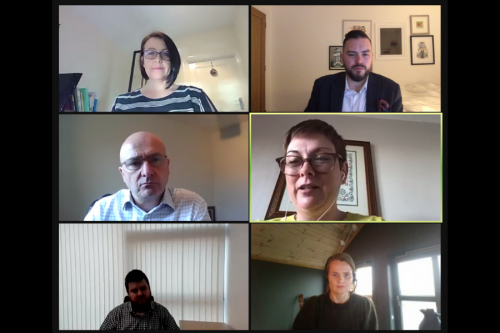“It’s not Government money that’s going to solve this, it’s private investment”

An expert panel outlined how the North can capitalise on a “Green Industrial Revolution”.
They spoke at a webinar arranged by TheBusinessDesk.com in partnership with international law firm CMS.
The event was chaired by Ben Ormsby, TheBusinessDesk.com’s Yorkshire editor.
Explaining how the Net Zero Carbon target can be achieved, speakers highlighted collaboration, clear policies from Government, heightened awareness among the general public and equipping people with the skills required for employment in the green economy.
The panel included Torbjørg Klara Fossum, vice president global carbon capture and storage, of Norwegian energy firm Equinor, which is working on renewable projects across the North, and ITM Power’s Andy Allen, which manufactures hydrogen energy solutions from its Sheffield base.
Also taking part were Myles Kitcher from Peel Environmental, which runs the strategic energy and resource hub Protos in Cheshire, Dr Annette Bramley, director of N8 Research Partnership who is leading on the group’s Net Zero North project, and Helen Boyle from Cadent Gas who has been instrumental in leading plans for decarbonising the North West.
Boyle said: “The North West is ideally placed to be capitalising on building back better after Covid.
“What we really need to do is pull together. This isn’t a competition – one area against another or one industrial cluster against another.”

Dr Annette Bramley
Bramley said: “A green recovery plan properly implemented can generate huge economic and social value for the Northern Powerhouse.
“An LGA report recently put job creation in the green economy at over one million by 2050.
“And the Northern Powerhouse is the best place to lead this recovery in the UK thanks to our science and research capabilities, our skills providers, our businesses and our natural assets.”
Fossum and Allen pointed to their companies’ technological solutions to the Net Zero challenge, with Fossum explaining how Carbon Capture Storage (CCS) locks CO2 away in underground reservoirs.
She said: “CCS is one of the few options that can deliver emissions reduction in hard to abate sectors, while retaining high value industries.
“One of the advantages of CCS is that it can enable production of large amounts of ‘Blue Hydrogen’.
“Blue Hydrogen is a fuel that can serve as a fuel switch option for energy intensive sectors, allowing a low carbon transition for a wide range of industries.”
She said CCS is particularly important for sectors which have no alternative routes towards decarbonisation.
“If you look at industries like cement and steel, it’s hard to foresee a future without those,” she said, adding that through CCS these can continue.

Torbjørg Klara Fossum
Allen, of ITM Power, explained the economic opportunities it could offer the region if a cluster of businesses can be formed. Highlighting that the Net Zero agenda is global. He said: “We manufacture electrolysers. These respond very quickly to changes in power so you can couple [them] with renewable energy and that creates hydrogen which can be green.
“We’ve just moved into a large giga factory which is the only giga factory in the UK for electrolysis equipment.
“We see a good chunk of our market as being export. Our capacity allows us to fulfil a lot of our ambitions in the UK as well.
“The funding we’re getting for research and development, for core product development, supports us in staying ahead of the curve.
“There’s also the stamp that says ‘Made in Sheffield’ which is actually really important for people who are looking for a quality product.
“People aren’t just looking for the very cheapest technology with electrolysers, they are looking for something they can rely on.”
Boyle noted that while local authorities have been setting ambitious timescales to achieve Net Zero, they have until recently been waiting for the Government to catch up.
“It’s not Government money that’s going to solve this, it’s private investment,” she added.
“So what we’ve been waiting for is the Government to send those kinds of signals to the private sector to say ‘this is what we think will happen’.
“And that’s what has happened recently with the Government’s 10-point plan for a Green Industrial Revolution.”

Andy Allen
Kitcher said local authorities, businesses and Local Enterprise Partnerships in the North West were co-ordinating to put together a roadmap for decarbonisation.
He said: “There’s a recognition that we need to achieve those policy objectives and give clarity around regulation which will allow the private sector and the public sector to invest.
“We’re in an improving environment. We haven’t had a clear energy policy for decades but we are seeing that now.”
Fossum said Norway provides an example of what can be achieved with a visionary Government policy.
“The only two CCS projects in operation in Europe are in Norway,” she said.
“That’s because the Norwegian government made bold, clear decisions back in 1991, where they decided to launch CO2 taxes to incentivise emission reduction.
“This has led to Norway being one of the most important frontrunners on CCS.
“To make this happen Government and industry need to see the long-term value in creating these industries. I think this is exactly the track the UK is on now.”
Speakers were sanguine about Brexit’s impact on attracting international investment for the green economy in the UK.

Myles Kitcher
Fossum said: “Private investors are happy to provide support so long as there is long-term Government ambition, stability, and return on investment.
“Brexit creates some unknowns but this happens a lot with policy. And the UK Government seems committed to the green agenda regardless.”
Bramley added: “Businesses will make decisions based on the assets they see in places, along with the expertise and the skills they see.
“It’s going to be a huge global market and if we can capitalise and put those conditions in place early on we’re going to be well placed in the North to capture a good share of that market, which will help drive the recovery that we need from Covid.”
The panel was also asked whether shifting to a Net Zero Carbon economy could be done without jeopardising growth.
Kitcher responded: “I do think growth and zero carbon do come together. People’s lives will change, but I don’t think we’re going to sacrifice things.
“We’ll evolve into a zero carbon society but that doesn’t mean abandoning economic principles or economic goals.
“It’s really important we don’t see a loss of jobs. We can decarbonise overnight by closing our industries down but that’s not what we’re talking about.”

Helen Boyle
Boyle said the consumer/customer element would be crucial in persuading the wider public to back Net Zero.
She warned: “One of the thorniest areas to decarbonise is heat in people’s homes, because it’s about the consumer making a choice over a technology.
“Unless it’s going to be mandated or paid for by Government, which seems unlikely.
“85% of the UK have their homes heated by natural gas at the moment.
“My concern is that awareness of the net zero challenge is quite low among consumers.”
Bramley said: “For people to embrace these changes they’ll need to become educated and aware of the need for Net Zero right from school level.
“And there needs to be opportunities for people coming out of carbon intensive businesses to upskill and position themselves for the great new opportunities in these expanding sectors.”








